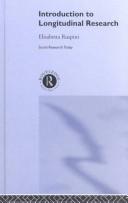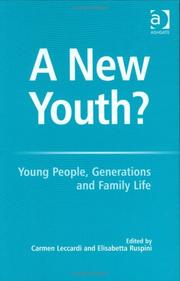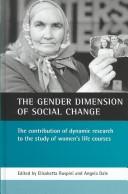| Listing 1 - 10 of 20 | << page >> |
Sort by
|
Book
ISBN: 9781447300922 1447300920 144731087X 1447300947 Year: 2013 Publisher: Bristol, U.K. : Policy Press,
Abstract | Keywords | Export | Availability | Bookmark
 Loading...
Loading...Choose an application
- Reference Manager
- EndNote
- RefWorks (Direct export to RefWorks)
This book aims to show that, in the twenty-first century, it is possible to live, love, and form a family without sex, without children, without a shared home, without a partner, without a working husband, without a heterosexual orientation or without a biological sexual body.
Families. --- Parenthood. --- Social change. --- Parenting.

ISBN: 0415260086 Year: 2002 Publisher: London Routledge
Abstract | Keywords | Export | Availability | Bookmark
 Loading...
Loading...Choose an application
- Reference Manager
- EndNote
- RefWorks (Direct export to RefWorks)
Social sciences --- Longitudinal studies. --- Research --- Methodology. --- Quantitative methods in social research
Multi
ISBN: 9781447300939 9781447300946 Year: 2013 Publisher: Bristol Policy
Abstract | Keywords | Export | Availability | Bookmark
 Loading...
Loading...Choose an application
- Reference Manager
- EndNote
- RefWorks (Direct export to RefWorks)
Sociology of the family. Sociology of sexuality --- #SBIB:316.356.2H1130 --- #SBIB:316.356.2H1131 --- #SBIB:316.356.2H3300 --- #SBIB:316.356.2H3360 --- #SBIB:316.356.2H3600 --- Hedendaagse gezinsstudies: algemeen --- Hedendaagse gezinsstudies: Europa --- Gezinssociologie: huwelijk: algemeen --- Gezinssociologie: alternatieve vormen van huwen en samenwonen (incl. homosexuele relaties) --- Gezinssociologie: voortplantingsgedrag en sexualiteit: algemeen
Book
ISBN: 144731087X 1447300947 1447300939 1299704867 1447300920 Year: 2013 Publisher: Bristol University Press
Abstract | Keywords | Export | Availability | Bookmark
 Loading...
Loading...Choose an application
- Reference Manager
- EndNote
- RefWorks (Direct export to RefWorks)
This book aims to show that, in the twenty-first century, it is possible to live, love, and form a family without sex, without children, without a shared home, without a partner, without a working husband, without a heterosexual orientation or without a biological sexual body.
Families. --- Parenting. --- Parent behavior --- Parental behavior in humans --- Child rearing --- Parent and child --- Parenthood --- Family --- Families --- Family life --- Family relationships --- Family structure --- Relationships, Family --- Structure, Family --- Social institutions --- Birth order --- Domestic relations --- Home --- Households --- Kinship --- Marriage --- Matriarchy --- Patriarchy --- Social aspects --- Social conditions --- Social change. --- Sex role. --- Parenthood. --- Change, Social --- Cultural change --- Cultural transformation --- Societal change --- Socio-cultural change --- Social history --- Social evolution --- Gender role --- Sex (Psychology) --- Sex differences (Psychology) --- Social role --- Gender expression --- Sexism
Book
Year: 2015 Publisher: Bristol Policy Press
Abstract | Keywords | Export | Availability | Bookmark
 Loading...
Loading...Choose an application
- Reference Manager
- EndNote
- RefWorks (Direct export to RefWorks)
De doelstelling van dit boek wordt als volgt geformuleerd: “to show that it is possible to live, love and form a family without sex, without children, without a shared home, without a partner, without a working husband, without a heterosexual orientation and without a ‘natural’ (=biological) sexual body.” Onze westerse samenleving kent vandaag allerlei ‘niet-traditionele’ gezinsvormen. Sedert de jaren zestig is het huwelijk en het gezin meer een meer een middel geworden tot zelfontplooiing en emotionele expressie, daar waar het voorheen eerder een plek was om aan de traditionele rol van echtgeno(o)t(e) en ouder te voldoen. Het boek is opgevat in twee secties. Hoofdstuk 1, 2 en 3 gaan respectievelijk over ‘aseksuele’ personen, kinderloze mannen en vrouwen en LAT-relaties. De hoofdstukken in de tweede sectie gaan dieper in op de impact van wijzigende genderrollen op het ouderschap, o.a. huismannen, alleenstaande ouders en tenslotte ook LGBT-ouders. Op het einde van elk hoofdstuk wordt ook de zichtbaarheid van deze diverse gezinsvormen (en hun ondersteunende bewegingen) op het internet en in sociale media aangehaald.
Sociology of the family. Sociology of sexuality --- Sexology --- Gender --- Family --- Transgender --- Single parents --- Homosexuality --- Househusbands --- Voluntary childlessness --- Life-forms --- Relationships --- Sexuality --- Book
Book
ISBN: 9782296136274 Year: 2010 Publisher: Paris : L'Harmattan,
Abstract | Keywords | Export | Availability | Bookmark
 Loading...
Loading...Choose an application
- Reference Manager
- EndNote
- RefWorks (Direct export to RefWorks)
Single parents --- Gay parents --- Transgender parents --- Parents uniques --- Parents homosexuels --- Parents transgenres

ISBN: 0415260078 Year: 2002 Publisher: London Routledge
Abstract | Keywords | Export | Availability | Bookmark
 Loading...
Loading...Choose an application
- Reference Manager
- EndNote
- RefWorks (Direct export to RefWorks)
Social sciences --- Longitudinal studies --- Research --- Methodology

ISBN: 0754644227 9780754644224 9781315565057 9781317187165 9781317187172 9781138253131 Year: 2006 Publisher: Aldershot Ashgate
Abstract | Keywords | Export | Availability | Bookmark
 Loading...
Loading...Choose an application
- Reference Manager
- EndNote
- RefWorks (Direct export to RefWorks)
Age group sociology --- Sociology of culture --- Youth --- Attitudes. --- Social conditions --- #SBIB:314H330 --- #SBIB:316.356.2H2220 --- #SBIB:316.7C131 --- Young people --- Young persons --- Youngsters --- Youths --- Age groups --- Life cycle, Human --- Bevolkingsstudies: leeftijdsgroepen: jeugd: algemeen --- Gezinssociologie: gezinsrelaties: algemeen --- Cultuursociologie: jeugdcultuur --- Attitudes
Book
ISBN: 1137595272 1137533544 1349554081 1349959820 Year: 2016 Publisher: New York : Palgrave Macmillan US : Imprint: Palgrave Macmillan,
Abstract | Keywords | Export | Availability | Bookmark
 Loading...
Loading...Choose an application
- Reference Manager
- EndNote
- RefWorks (Direct export to RefWorks)
Both research and policy on balancing work and family life have tended to focus on mothers' lives. There has been a general lack of comparative research to the complex intersection between old and new forms of masculinity; and between fatherhood, work-life balance, gender relations and children's well-being. As a result, men's fathering roles and their struggle with work-life balance have often been neglected. These cultural challenges should be better theorized within family and social policy research. This volume examines how fathers fulfill their roles both within the family and at work and what institutional support could be of most benefit to them in combining these roles.
Work and family. --- Work-life balance. --- Fathers. --- Stay-at-home fathers. --- Men --- Employment of men --- Stay-at-home dads --- Fathers --- Dads --- Parents --- Househusbands --- Life-work balance --- Time management --- Quality of life --- Work --- Work and family --- Families and work --- Family and work --- Families --- Dual-career families --- Work-life balance --- Employment. --- Sociology. --- Industrial sociology. --- Feminist theory. --- Gender Studies. --- Family. --- Sociology of Work. --- Sociology of Family, Youth and Aging. --- Feminism. --- Feminism --- Feminist philosophy --- Feminist sociology --- Theory of feminism --- Sociology --- Industrial organization --- Industries --- Social theory --- Social sciences --- Philosophy --- Social aspects --- Families. --- Families—Social aspects. --- Social groups. --- Family --- Family life --- Family relationships --- Family structure --- Relationships, Family --- Structure, Family --- Social institutions --- Birth order --- Domestic relations --- Home --- Households --- Kinship --- Marriage --- Matriarchy --- Parenthood --- Patriarchy --- Association --- Group dynamics --- Groups, Social --- Associations, institutions, etc. --- Social participation --- Social conditions

ISBN: 1861343329 9786612318894 1447303822 1282318896 184742547X Year: 2002 Publisher: Bristol The Policy Press
Abstract | Keywords | Export | Availability | Bookmark
 Loading...
Loading...Choose an application
- Reference Manager
- EndNote
- RefWorks (Direct export to RefWorks)
This new study uses longitudinal data to provide new insights into the changing dynamics of lives of women today. In particular, it explores the potential of longitudinal or life course analysis as a powerful tool for appreciating the gender dimension of social life.
#SBIB:316.346H20 --- 316.42 --- #SBIB:316.8H15 --- #SBIB:314H210 --- 316.42 Social change. Sociale ontwikkeling. Sociale veranderingen. Modernisering. Evolutie .Sociale revolutie. Modernisme --- Social change. Sociale ontwikkeling. Sociale veranderingen. Modernisering. Evolutie .Sociale revolutie. Modernisme --- Positie van de vrouw in de samenleving: algemeen --- Welzijns- en sociale problemen: sociale ongelijkheid en armoede --- Demografie: algemeenheden --- Sociology of the family. Sociology of sexuality --- Sociology of work --- Social policy --- Income --- Wages --- Great Britain --- Germany --- Sweden --- Netherlands --- Japan --- Women --- Social change --- Longitudinal method --- Social conditions --- Longitudinal research --- Longitudinal studies --- Methodology --- Research --- Social sciences --- Pay gap --- Motherhood --- Labour --- Labour market --- Independence --- Paid labour --- Book
| Listing 1 - 10 of 20 | << page >> |
Sort by
|

 Search
Search Feedback
Feedback About UniCat
About UniCat  Help
Help News
News